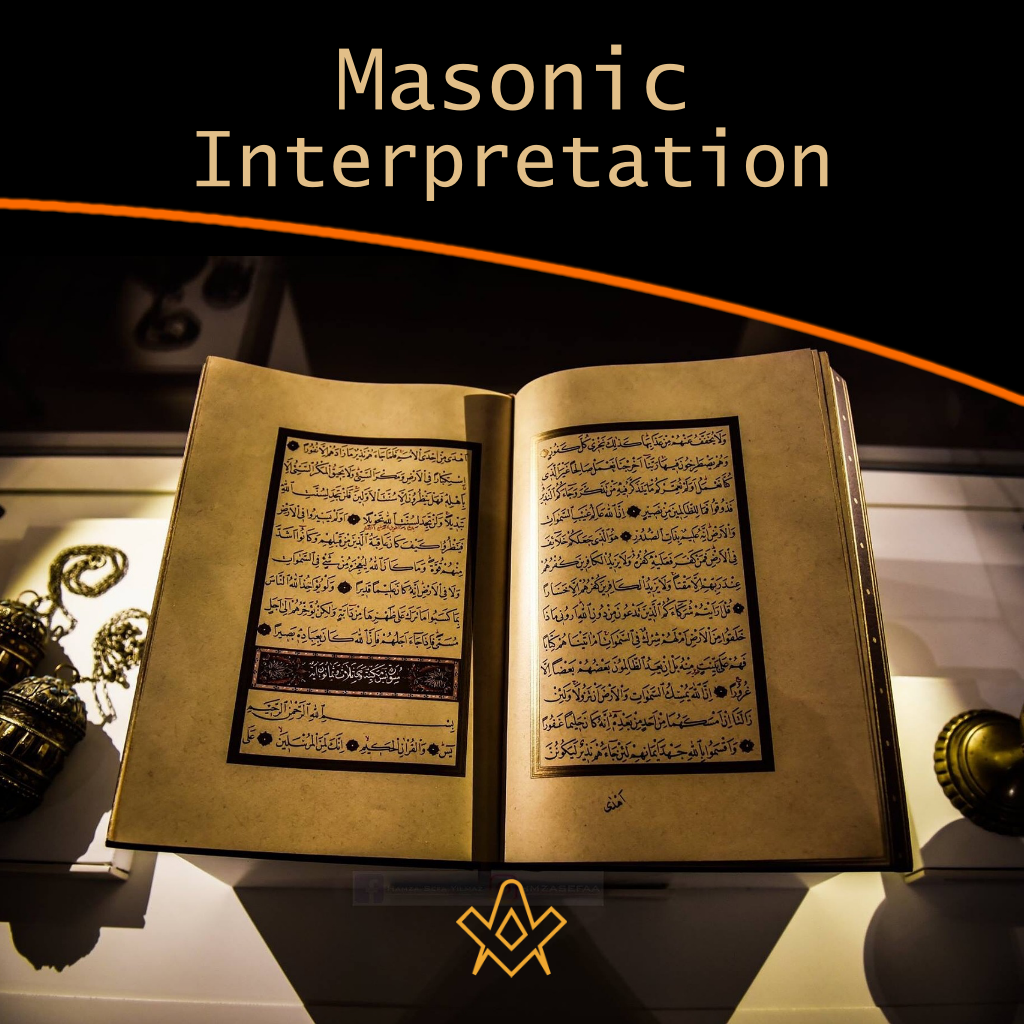As a free and accepted Mason who is striving to become a better person with the united help of Square and Compass and also as a Muslim (peace-seeker) who places his trust on the Quran (The Message), I am writing this paper to demonstrate how the representation of Islam (Peace) in the Quran complements the universal values of Freemasonry.
By: Ali Yenidunya, a Freemason and a local secretary of QCCC in the UK.
It is inspiring to witness not only that their readings of the universe offer the same peaceful world but also that they both encourage human beings to become critical, open-minded, self-aware about their surroundings and also to commit to make the necessary changes they see fit to make the world they live in a better place.
Due to the fact that the analysis of the whole book would require a much longer paper, I have chosen to limit my paper with the first two chapters only.
I will evaluate each chapter within its own context and engage critically from the point of view of Freemasonry. The aim of this paper is not to educate but to offer an alternative reading.
The ALAQ (Love)
This chapter is chronologically the first one. Simply put, it summarises the nature of God and man and sheds light into the progression of the latter through action-based morality.
Read in the name of your Lord who has created.
He created the human being from ALAQ.
Read, and your Lord is the Generous One.
The One who taught by the pen.
He taught the human being what he did not know.
Alas, the human being is bound to transgress
When he sees himself complete (exempt).
To your Lord is the return.
Have you seen the one who deters,
A person from being supportive?
What if he was walking a righteous path?
What if he was calling to become more careful?
Would it be better if he lied and turned away?
Did he not know that God can see?
Alas, if he does not cease, we will strike the front head.
The deceitful, sinful front head.
So, let him call on his supporter.
We will call on the guardians.
So do not obey him, focus on your path and come near.
Analytically, we can divide the chapter into two sections.
Firstly, it is important to note that the G.A.T.U. or al-Ilah (the God) clearly mentions that human beings are created out of Alaq.
What is it? It literally means “connection” – a special bond that attaches the Eternal to the things created.
In other words, it is pure love that blasted (and is continuously being blasting) in space and spread (and is continuously being spreading) Its blueprint which “aided” (and is continuously being aiding) Its creatures.
It is what creates space and the existence of time, accordingly. So, the love of G.A.T.U. was bound to explode.
Ontologically, it was what this attachment / connection necessitated by its nature rather than a mere choice.
It is the “Generous One” who is always in the process of creation. This means that Its presence or “aid” is everywhere at the same time.
This reminds me of 50:16 where it says that “We are closer to him than his jugular vein”.
This also teaches us that, ontologically, God is the source of energy that not only revitalises but also flows through its physical, chemical, biological and mathematical laws that It has been creating.
This is where we can witness Its blueprint and the way It aids. Therefore, God does not aid through miracles.
On the contrary, It does not and cannot contradict the laws of creation. If there is anything that binds its will, this is nothing but the Truth in the form of logics and consistency based on science.
That is why, we are not afraid to step on black squares but are happily embracing both, understanding that the universe we live in consists of both blacks and whites together and that we can find the Creator’s unlimited aid cognitively.
Besides, no matter how close we reach toward the East and regardless of the extent of the Temple we are committed to build in our hearts, we live in a grey universe that works and treats us in the same way.
All we need is to understand the Eternal nature and adapt to it, by sharing love through honour, mercy and virtues.
The second important part of the chapter is the comparison between two individuals.
On one hand, one figure is depicted as supportive of others, walking on a righteous path and paying attention to details whereas the other preventing others from doing so.
The former can read his surrounding well whereas the latter sees himself on top others. This is crucial because we Masons know that our goal in the Temple is not to become “complete” in the sense of reaching perfection.
By knowing that we are not perfect, we strive every moment with our tools to become a better person. And the first step we put is always charity that stands for the beauty knocking for the truth.
It is the intention and motivation of setting the corner stone of our own temples as far as possible in the North East that defines the contours of our struggle in life.
The moment we feel complete and exempt, we will be bound to break down from within.
By remembering the love of God which has been giving life not only to human beings but also all things created, we should be able to read our surroundings and love and respect every living creature.
We are not above any other species but equal with them in terms deserving to live in peace and harmony.
The Pen
In this second chapter, there are a few important points which summarize what Islam and being a Muslim mean.
It is also interesting that the name of this chapter is “The Pen”. After acknowledging the boundless love of the Creator and mentioning that supporting each other is the righteous way for salvation, the Pen is teaching the details of this love.
Let the pen speak! Let what is written come!
You are not, by the blessing of your Lord, crazy.
This, apart from being a blessing and honouring, is a well-deserved response to you.
You are on a high moral standard.
Soon, you will see, and they will see
Which of you are on a power beyond reason.
Your Lord is fully aware of those who strayed off Its path, and It is fully aware of those who are guided.
Up to here, God is speaking to Mohammad who is blamed of being crazy. But the reason of this blame is not because he believes in God.
In fact, when the revelation started, the majority of the population of Macca believed in God.
The accusation is due to socio-economic reasons and these demands are closely related to the definitions of Islam and being a Muslim.
Secondly, God is showing Its standardisation. Once we are on the right path, leading with reason and moral virtues, we are guided, honoured and blessed.
So do not obey those who deny.
They wish that you compromise, so they too can compromise.
Do not obey every lowly swearer.
A slanderer, a backbiter.
Forbidder of charity, a transgressor, a sinner.
Because he possesses money and children
He says: “Tales from the past!” when Our signs are recited to him,
We will mark him on the path.
Again, the characteristics of an individual who sees himself exempt or complete are listed here.
We see that the general tendency comes from the thought that he is strong and unreachable because of the trust he places in worldly possessions or in the number of other humans/children around himself.
And his first reaction to criticism is a quick denial. In order not to have his possessions being shaken, he can approach for a compromise so that you can leave your way.
For the sake of the status quo, he can even say what was told to Moses and Aaron: “Did you come here to destroy what was established by our forefathers so that the state will be left to you?” (10:78).
We will test them like We tested those who owned the farms, when they agreed that they would harvest it in the morning.
They were without doubt.
So, a disaster happened while they all were asleep.
Thus, it became barren.
They called on one another when they awoke.
“Let us go this morning to harvest the crop before a poor person comes to our presence”
They went, ready to harvest.
But when they saw it, they said, “We have gone astray!”
“Now, we have nothing!”
The most merciful among them said, “Did I not tell you to consider your Lord!”
They said, “Glory be to our Lord. We have transgressed.”
They understood what happened and said: “Lord, you are great! Apparently, we were unfair to you.”
Then, they started blaming each other.
“Shame on us! How selfish we were!”
Finally, they said: “Perhaps our Lord will grant us better than it. We should not give up our hope in Lord. We must learn that we shall put our trust in It .”
Such was the punishment. But the retribution of the Hereafter is far worse, if they only knew.
The righteous who surrender [to puts trust in God] have deserved, at their Lord, paradises of bliss.
Should We treat Muslims [the ones who peacefully surrendered] the same as those who are criminals?
This story about the owners of the farm is the heart of this chapter. Again, the initial reaction before witnessing the “disaster” rests on the trust placed in worldly possessions.
However, the real disaster hits them when they understood the reality. They were so selfish that they were even running away from poor people who could have come up and asked for some of the products. They were blind and deaf.
They did not surrender to God’s will. They did not trust God enough. They were afraid of sharing and wanted to have more than they needed.
Therefore, a Muslim is the one who trusts in God [God’s creation and its natural laws] alone, knowing that the world offers enough to all of us for our basic needs and even more than that.
In 2:19, the Creator tells that the righteous ones shall give away what they don’t need. Therefore, a Muslim is a person who does not build up an empire.
He can save only what he will need tomorrow; nothing more. He should not act as if he is going to live forever.
As seen, gaining virtues through charity becomes the corner stone of a Muslim. It is always his first step.
This also points out that the word “Muslim” is not a position occupied by someone who claims to believe in one God.
On the contrary, paying for a lip service is criticized by the Creator. A Muslim is anyone who is self-aware of his surroundings and who is working hard on the Level to become equal with those who are more disadvantageous than himself.
What is wrong with you, how do you judge?
Or do you have another book which you study?
In it, does it say that “You can do whatever you wish”?
Or do you have an oath from Us, extending until the day of resurrection, that you can judge as you please?
Ask them: “Who of them will make such a claim?”
Or do they have partners? Then let them bring their supporters, if they are truthful.
When death comes, it is too late to believe [put trust in Lord]. Now they cannot even if they want to.
With their eyes subdued, humiliation will cover them. They were being invited to believe [put trust in Lord] when they were healthy and able.
Therefore, let Me deal with those who reject this word; We will lead them to the edge of the cliff before they understand.
I allow time for them.
My judgement is solid.
Or did you ask them for a wage, so they are burdened by the fine?
Or do they know the future and speak accordingly?
You shall be patient for the judgment of your Lord. Do not be like the companion of the fish who called out while he was in sorrow.
Had it not been for his Lord’s grace, he would be ejected to the shore, in disgrace.
But his Lord blessed him and made him righteous.
Those who have rejected almost attack you with their eyes when they hear the reminder, and they say, “He is crazy!”
However, it is nothing but a reminder of the essence of humanity.
Lastly, the Creator heavily criticizes those who favour for accumulating fortunes.
Here, the boundaries of belief or the trust placed in God is given. No remorse will make a futile life spent for worldly possessions forgiven. The death is the solid judgement of the Creator.
As Master Masons, we know that there will be an end of this life and that we shall constantly question ourselves, our paths and our daily choices.
This reminds us of going back to the working tools presented to us when we were first initiated; when we were divested of metals, poor and humble.
We are told to use the gavel to re-shape our perception, the 24-inch gauge to adjust our time efficiently and the chisel to polish our thoughts and actions.
That is why a Mason is repeatedly taking his journey from the South West toward the East and back to the West again.
It is to become a better person, to stay on the righteous pathway.
Conclusion
As noticed, a Muslim is reminded of his universal duties just as a Freemason.
They are both well-rounded individuals who heed their environments, critically engage with the socio-economic realities of their surroundings and compete to help to those who are in need.
They place their trust in one Creator who acts with pure love and equality. It is human beings who need to keep the Creator’s justice in nature available for all rather than for the few.
Surely, those who believe [acknowledge], Jews, Christians and those who believe in other religions … whoever believe [acknowledge] in God, the Judgement day and work for goodness, charity and righteousness, they will have their reward with their Lord, with no fear over them, nor will they grieve.
(2:62)
I have always attributed a special place to this verse (2:62) for its universal greeting and for bringing the great news for those who call themselves as ‘believers’ or who acknowledge the truth.
Within the context of the whole book, it is witnessed that the struggle of human kind is historically between those who have and those who don’t.
The Message calls on believers to acknowledge this truth and set a clear line against the accumulation of wealth.
If anyone on this Earth recognises this message and works as an example who shares what is more than his needs, he is called a Muslim, a peace-seeker and will be awarded.
Therefore, according to the Quran, the word “Muslim” is an umbrella term, just as what the word “Freemason” represents.
The very basic and important teaching of Islam or the guidance for peace is what we Freemasons are actually trying to achieve on Earth.
When we are connected with the celestial globe and observing the truth of the Creator, we understand that we will happily spread equality by squaring our actions through the justice of the compass. Therefore;
We SEEK for RELIEF by THE HELP GOD which requires WISDOM/VIRTUE. To acquire it, we need have FAITH in the VSL (in what CHALK can write). We use the GAVEL to adjust your conscience accordingly.
ASK for BROTHERLY LOVE by being FREE which requires STRENGTH/HONOUR. To acquire it, we need to have HOPE (in the light against which no metal can endure) on the SQUARE (squaring your actions). We use the 24-INCH GAUGE to adjust your time/actions accordingly.
KNOCK for TRUTH by GOOD REPPORT which requires BEAUTY/MERCY. To acquire it, we need to do CHARITY work (by which we can return Mother Earth’s continually labouring for our support) through the COMPASS. We use the CHISEL to adjust your heart/tongue accordingly.
Freemasonry and Islam do complement each other in terms of their universal messages.
They look at the world from the same perspective and make good men better. Let me finish my words with Rumi’s “Far Mosque”:
The place that Solomon made to worship in,
called the Far Mosque, is not built of earth
and water and stone, but of intention and wisdom
and mystical conversation and compassionate action.
Every part of it is intelligence and responsive
to every other. The carpet bows down to the broom
The door knocker and the door swing together
like musicians. This heart sanctuary does
exist, but it can’t be described. Why try!
Solomon goes there every morning and gives guidance
with words, with musical harmonies, and in actions,
which are the deepest teaching. A prince is just
a conceit until he does something with generosity.
Article by: Ali Yenidunya
Ali Yenidunya is a local secretary of QCCC in the UK. He is an education consultant and is currently undertaking a Legal Practice Course.
He studied International Relations at Ankara University, Turkey, and undertook his Masters degree in IR Theory at the University of Birmingham.
His MPhil thesis was written on the Israeli-Palestinian conflict and, over the past decade, he has written numerous analytical papers for Enduring America Worldview (previously ‘Enduring America’). He is a Master Mason and Companion in RA, and serves as Communications Officer at Knowle Masonic Centre.
Recent Articles: symbolism
 Legends and Symbols in Masonic Instruction Explore the significance of Masonic legends and symbols in this insightful post. Discover how Freemasonry imparts wisdom through allegorical narratives and emblematic imagery, revealing profound moral and philosophical lessons. Unveil the deep connections between Masonic teachings and the broader quest for understanding life’s fundamental questions. |
 Discover the mystical significance of the number 33. From its mathematical marvels and artistic influence in numerology to its esteemed place in Freemasonry, delve into the history and power of this master number. Explore why 33 holds such profound meaning in various spiritual and philosophical traditions. |
 The Practice of Freemasonry - P1 Embark on a transformative journey with Freemasonry, where the exploration of your Center unlocks the Perfect Ashlar within. Through the practices of Brotherly Love, Relief, Truth, and Cardinal Virtues, discover a path of enlightenment and self-improvement. Embrace the universal creed that binds us in the pursuit of our true essence. |
 Discover the fascinating history and significance of the Warrant of Constitution within Freemasonry. Unveil the evolution of this crucial authorization, its role in legitimizing Lodges, and its lasting impact on the global brotherhood of Freemasons. Explore the intricate link it provides between tradition and modern practice. |
 Freemasonry: Unravelling the Complexity of an Influential Organization Mysterious and captivating, Freemasonry has piqued the interest of seekers and skeptics alike. With its intricate blend of politics, esotericism, science, and religion, this enigmatic organization has left an indelible mark on society. Prepare to delve into the secrets of Freemasonry and unlock its hidden depths. |
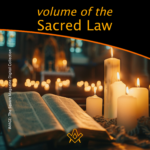 Unlocking the Mysteries of Freemasonry: In the hallowed halls of Freemasonry, a powerful symbol lies at the heart of ancient rituals and teachings—the Volume of the Sacred Law. This sacred book not only guides the spiritual and moral journey of Freemasons but also serves as a beacon of universal wisdom and enlightenment. |
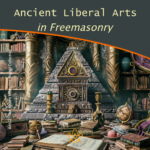 The Ancient Liberal Arts in Freemasonry Embark on a journey of self-improvement and wisdom with Freemasonry's guiding principles. Ascend the winding stairs of moral cultivation, analytical reasoning, and philosophical understanding. Embrace arithmetic's mystical properties and geometry's universal truths. Let the harmony of the universe inspire unity and growth. Discover the profound, hidden knowledge in Freemasonry's path to enlightenment. |
 Initiation rituals around the world are filled with fascinating elements and different images. One of them is that of darkness. When societies speak of darkness, they often mean a lack of knowledge, a lack of choice, or a symbol of evil. During initiation rituals, darkness is used to represent the initiate's lack of knowledge about the world, society, and initiation in general. It can also represent the initiate's inability to make a choice or endure a situation. Whether you have participated in an initiation rite or not, the meaning of darkness remains an intriguing concept worth exploring. Initiation rituals around the world are filled with fascinating elements and different images. One of them is that of darkness. When societies speak of darkness, they often mean a lack of knowledge, a lack of choice, or a symbol of evil. During initiation rituals, darkness is used to represent the initiate's lack of knowledge about the world, society, and initiation in general. It can also represent the initiate's inability to make a choice or endure a situation. Whether you have participated in an initiation rite or not, the meaning of darkness remains an intriguing concept worth exploring. |
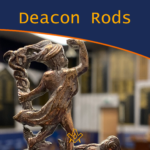 Masonic Deacon rods potentially trace their origins to Greek antiquity, symbolically linked to Hermes' caduceus. As Hermes bridged gods and mortals with messages, so do Masonic Deacons within the lodge, reinforcing their roles through ancient emblems. This connection underscores a profound narrative, weaving the fabric of Masonic rites with the threads of mythological heritage, suggesting the rods are not mere tools but bearers of deeper, sacred meanings that resonate with the guardianship and communicative essence of their divine counterpart, Hermes, reflecting a timeless lineage from myth to Masonic tradition. |
 The biblical pillars erected by Solomon at the Temple's porch, hold a profound place in history. These brass behemoths are not mere decorations; they are symbols of strength, establishment, and divine guidance. Explore their fascinating construction, dimensions, and the deep meanings they carry in both biblical and Masonic contexts. |
 Unlocking the Mind's Potential: Dive deep into ground breaking research revealing how simple daily habits can supercharge cognitive abilities. Discover the untapped power within and redefine your limits. Join us on this enlightening journey and transform your world! |
 Dive deep into the symbolic importance of the trowel in Masonry, representing unity and brotherly love. From its historical roots in operative masonry to its significance in speculative masonry, this article explores the trowel's multifaceted role. Discover its connection to the sword, the story of Nehemiah, and the Society of the Trowel in Renaissance Florence. Unravel the layers of meaning behind this enduring Masonic symbol. |
 Symbolism of The Builder's Jewel Batty Langley's "The Builder’s Jewel" (1741) is a visual masterpiece of Masonic symbolism, showcasing Langley's deep understanding of Freemasonry. The frontispiece highlights key symbols like the three pillars and the legend of Hiram Abiff, emphasizing Langley's dedication to Masonic traditions and teachings. |
 Unveil the mystique of the colour blue in Masonic symbolism. A hue evoking universal friendship and benevolence, its roots span ancient cultures, infusing Freemasonry's core values. This article explores blue's profound significance, guiding Freemasons towards wisdom and spiritual enlightenment. Discover the fascinating journey of this universal symbol. |
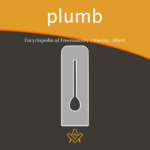 Discover the intriguing world of the plumb in Masonic symbolism with our in-depth analysis. Uncover its rich history, moral teachings, and significance in Freemasonry, guiding members on their path to truth, integrity, and justice. Immerse yourself in the captivating power of this symbol that shapes lives within the brotherhood. |
 Unlock the mysteries of Freemasonry with 'The Key,' a profound Masonic symbol. This seemingly simple instrument holds a deeper meaning, teaching virtues of silence and integrity. Explore its ancient roots, from Sophocles to the mysteries of Isis, and discover how it symbolizes the opening of the heart for judgment. |
 Unlock the secrets of the Freemasonry with The Blazing Star - a symbol that holds immense significance in their rituals and practices. Delve into its history, meaning and role in the different degrees of Freemasonry with expert insights from the Encyclopedia of Freemasonry by Albert Mackey. Discover the mystique of The Blazing Star today! |
 There is no symbol more significant in its meaning, more versatile in its application, or more pervasive throughout the entire Freemasonry system than the triangle. Therefore, an examination of it cannot fail to be interesting to a Masonic student. Extract from Encyclopedia of Freemasonry by Albert Mackey |
 The Hiramic Legend and the Myth of Osiris Hiram Abiff, the chief architect of Solomon’s Temple, is a figure of great importance to Craft Freemasonry, as its legend serves as the foundation of the Third Degree or that of a Master Mason. He is the central figure of an allegory that has the role of teaching the Initiate valuable alchemical lessons. Although his legend is anchored in biblical times, it may have much older roots. |
 This rite of investiture, or the placing upon the aspirant some garment, as an indication of his appropriate preparation for the ceremonies in which he was about to engage, prevailed in all the ancient initiations. Extract from The Symbolism of Freemasonry by Albert G. Mackey |
 The All-Seeing Eye of God, also known as the Eye of Providence, is a representation of the divine providence in which the eye of God watches over humanity. It frequently portrays an eye that is enclosed in a triangle and surrounded by rays of light or splendour. |
 What's in a Word, Sign or Token? Why do Freemasons use passwords, signs, and tokens? As Freemasons we know and understand the passwords, signs and tokens (including grips), which are all used a mode of recognition between members of the fraternity. |
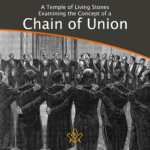 A Temple of Living Stones: Examining the Concept of a Chain of Union What are the origins of the Chain of Union? And how did they come about ? The answers may surprise some members as W Brother Andrew Hammer investigates, author of Observing the Craft: The Pursuit of Excellence in Masonic Labour and Observance. |
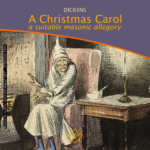 One of the best loved stories for the festive season is ‘A Christmas Carol’. A traditional ghost story for retelling around the fire on a cold Christmas Eve, it is a timeless classic beloved by those from all walks of life. Philippa explores the masonic allegory connections… |
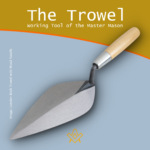 The Trowel - Working Tool of the Master Mason The Trowel is the symbol of that which has power to bind men together – the cement is brotherhood and fellowship. |
 Two Perpendicular Parallel Lines The point within a circle embordered by two perpendicular parallel lines, with the Holy Bible resting on the circle, is one of the most recognizable symbols in Freemasonry. It is also one which always raises a question. How can two lines be both perpendicular and parallel? |
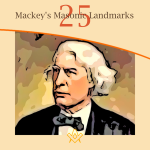 "The first great duty, not only of every lodge, but of every Mason, is to see that the landmarks of the Order shall never be impaired." — Albert Mackey (1856) |
 It is common knowledge that the ancient wages of a Fellowcraft Mason consisted of corn, wine, and oil. |
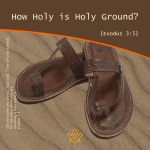 “Do not come any closer,” God said. “Take off your sandals, for the place where you are standing is holy ground.” Exodus 3:5 |
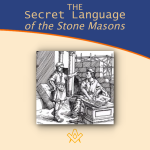 The Secret Language of the Stone Masons We know of Masons' Marks but lesser known are the 'argots' used by the artisans - in part 2 of a series on the social history of the Operative Masons we learn how the use of secret languages added to the mystery of the Guilds. |
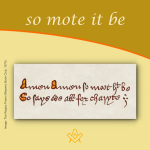 The phrase appears in the Regius Poem. It is customary in contemporary English to end prayers with a hearty “Amen,” a word meaning “So be it.” It is a Latin word derived from the Hebrew word - Short Talk Bulletin - Vol. V June, 1927, No.6 |
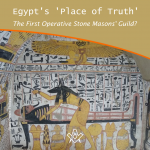 Egypt's 'Place of Truth' - The First Operative Stone Masons' Guild? Was ancient Egypt's 'village of the artisans' the first operative stone masons' guild? And was their use of 'identity marks' a forerunner of the Mason's Marks of the cathedral builders of the Middle Ages? Read on for some possible answers… |
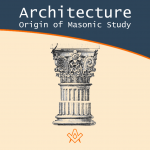 The Pieces of Architecture and the Origin of Masonic Study Discover the journey of the Apprentice – from Operative to Speculative. This journey has been carried out since the times of operative Freemasonry but today the initiate works in the construction of his inner temple. |
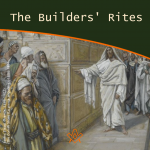 The Builders' Rites - laying the foundations operatively and speculatively The cornerstone (also ‘foundation’ or ‘setting’ stone) is the first stone to be set in the construction of the foundations of a building; every other stone is set in reference to this. |
 Applying the working tools to achieve our peculiar system of morality. |
 We take an in-depth look at the 47th Proposition of the 1st Book of Euclid as part of the jewel of the Past Master. |
 The Cable Tow: Its Origins, Symbolism, & Significance for Freemasons - Unbinding the significance of the cable tow. |
 We examine at one of the most impressive moments of the initiatory ceremony, a certain rite known as Circumambulation, and ask what is its meaning and purpose ? |
 So, what is the Level? And why do we use it in Freemasonry? |
 What is the mysterious pigpen or Masonic cipher that has been used for centuries to hide secrets and rituals? |
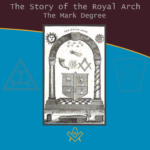 The Story of the Royal Arch - The Mark Degree Extracted from William Harvey's 'The Story of the Royal Arch' - Part 1 describes the Mark Degree, including the Working Tools. |
 Ashlars - Rough, Smooth - Story of a Stone How we can apply the rough and smooth Ashlars with-in a masonic context |
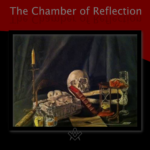 A detailed look at the Chamber of Reflection: A Revitalized and Misunderstood Masonic Practice. |
 Exploring the origin and symbolism of Faith, Hope and Charity |
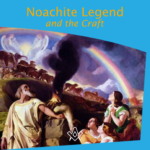 The Noachite Legend and the Craft What is it to be a true Noachidae, and what is the Noachite Legend and the Craft ? |
 In Masonic rituals, Jacob’s ladder is understood as a stairway, a passage from this world to the Heavens. |
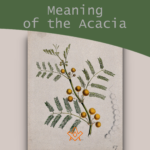 What is the meaning of the Acacia and where did it originate ? |
 What is the connection with the Feasts of St John and Freemasonry |
 The Forget-Me-Not and the Poppy - two symbols to remind us to 'never forget' those who died during the two World Wars. |
 Biblical history surrounding the two pillars that stood at the entrance to King Solomon's Temple |
 Is there a direct link between Judaism and Freemasonry? |
 The symbolism of the beehive in Masonry and its association with omphalos stones and the sacred feminine. |
 The Wages of an Entered Apprentice |
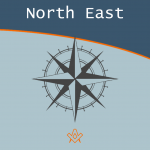 An explanation of the North East corner charge which explores beyond one meaning Charity - |
 A brief look at the origins of the two headed eagle, probably the most ornamental and most ostentatious feature of the Supreme Council 33rd Degree Ancient and Accepted (Scottish ) Rite |
 A Muslim is reminded of his universal duties just as a Freemason. A Masonic Interpretation of the Quran's First Two Chapters |
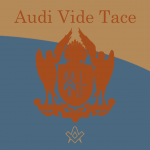 The three Latin words -{Listen, Observe, Be Silent}. A good moto for the wise freemason |
masonic knowledge
to be a better citizen of the world
share the square with two brothers

click image to open email app on mobile device



